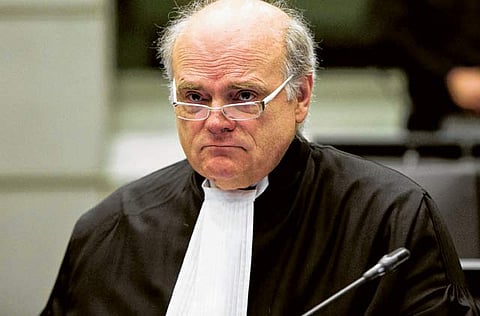Hariri court begins hearing on terror charges
UN-backed Hariri tribunal tries to thrash out what constitutes an act of terrorism

Leidschendam, Netherlands: Lawyers and judges at a UN-backed tribunal tried on Monday to thrash out the question of what constitutes an act of terrorism, and other legal issues, as they prepare to prosecute suspects for the assassination of former Lebanese Prime Minister Rafik Hariri.
A hearing at the Special Tribunal for Lebanon aimed to clarify laws the court will apply when trying those allegedly responsible for the truck bomb that killed Hariri and 22 others in Beirut on February 14, 2005.
Tribunal President Antonio Cassese of Italy said the hearing showed that Lebanon "is set on a course for judicial accountability through the rule of law."
Prosecutors last month filed a sealed indictment to a judge who will take up to ten weeks studying the charges and evidence before deciding whether the case can proceed.
Speed up path to trial
By clarifying legal issues now, the court hopes to speed up the path to its first trial, expected to begin later this year with or without a suspect in custody.
Prosecutor Daniel A. Bellemare sent a still-sealed indictment on January 17 to pre-trial judge Daniel Fransen. It is widely expected that members of the Shiite group Hezbollah will be named in the tribunal's indictment. Hezbollah denies any involvement in Hariri's slaying and its leader, Hassan Nasrallah, has said his group would "cut off the hand" of anyone who tries to arrest any of its members.
Unlike other international courts, the Hariri tribunal can hold trials in absentia if suspects cannot be arrested.
Prosecutors and defence lawyers agreed yesterday that Lebanese law, which the tribunal uses, already has a definition of terrorism while the international community has wrangled for years without coming up with a single definition.
"There is no reason to go further and create an overarching, worldwide, universal definition," prosecution lawyer Iain Morley said.
However he sought to refine the definition they will use at future trials.
"In any terrorist trial there will be an interest in why the event took place," Morley told the five-judge panel. "But if one fails to prove the exact reason ... that should not mean that the offence has not been properly proved."
In sometimes abstract arguments, lawyers and judges cited Greek philosopher Plato and 18th century French thinker Montesquieu, and discussed whether the 1914 assassination in Sarajevo of Archduke Franz Ferdinand could be classified as an act of terror.
Other topics under discussion were what constitutes a conspiracy, how to define intentional homicide and whether suspects should face more than one charge based on the same alleged crime — so-called cumulative or alternative charging.
Lebanon crisis: Israel halts village exit
Israel has frozen plans to withdraw from a village along the border with Lebanon, an official source said on Monday, due to the political turmoil which last month toppled the government in Beirut.
"The plan was put on the back burner after Hezbollah brought down the Lebanese government" of prime minister Sa'ad Hariri, a senior official told AFP.
"Israel agreed to hand over control of a certain part of the village to Unifil, but it was understood that (Unifil) needed a green light from the Lebanese government," he said.
Israel approved the pullout in November. But two months later, Hariri's Western-backed government collapsed, and a new administration has yet to be appointed, making it "impossible in the current situation to reach such an agreement with the Lebanese authorities".
Should it eventually happen, the pullout will see Israel withdrawing its troops from the northern part of Ghajar village and redeploying south of the UN "blue line" demarcating the border, he said.
— AFP



